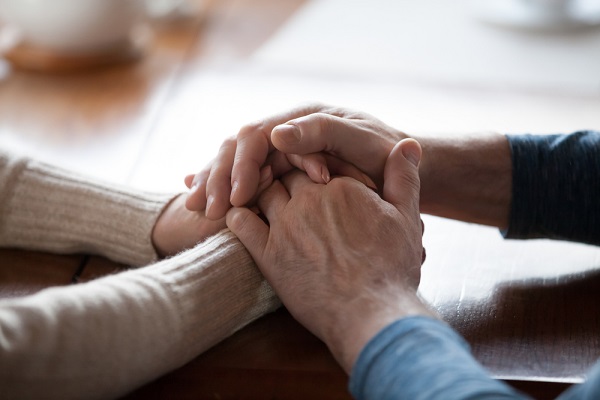While everyone’s journey is unique, there are common end of life signs and stages that can help you understand where they are in the process.
Knowing these can help you emotionally prepare and ensure that your loved one’s final days are as peaceful and comfortable as possible.
This period can also serve as a time to consider practical matters, such as ensuring their funeral plans are documented for peace of mind.
In the months leading up to death, many people begin to withdraw from the world around them. You may notice your loved one sleeping more than usual and showing less interest in social activities or hobbies they once enjoyed. It’s common for them to eat and drink less, often only nibbling at food or sipping small amounts of fluid.
Common end of life signs include:
This period can be emotionally challenging, but it’s also an opportunity to talk about your loved one's wishes and make any necessary arrangements.
Encourage conversations about what’s important to them, including their preferences for care, legal matters like wills, and any specific funeral plans.


As your loved one moves closer to the end, you may notice that their physical decline becomes more apparent.
They may become bed-bound, sleeping for most of the day, and will likely have little to no appetite. It’s important not to force food or drink on them; at this stage, the body naturally requires less energy.
Look out for these end of life signs:
Try creating a calm environment with soft lighting and soothing music. It's normal for them to experience these symptoms as their body slows down during this stage of the end of life timeline.
In the final days, physical signs become more pronounced. You might notice changes in breathing patterns, sometimes described as a "death rattle" due to congestion in the lungs or throat. Breathing may become irregular, with long pauses between breaths. Their skin may start to look mottled or pale, particularly on the hands, feet, and knees.
Signs to be aware of include:
During this time, your loved one might not respond to you, but they can often still hear, so continue to speak in soothing tones. Your presence, even in silence, can provide immense comfort.


As death approaches, the body continues to shut down. Your loved one may be unconscious, with shallow or gasping breaths, and their pulse will become weaker. Their hands, feet, and ears may feel cold to the touch due to reduced circulation. It’s possible that their eyes will remain partially open or look glassy.
Final signs may include:
At this stage, it’s most important to be present, holding their hand and offering reassurance. A quiet room with dimmed lighting can create a peaceful atmosphere.
If your loved one shows signs of discomfort, speak with their care team, who can help manage any pain.
It’s natural to feel concerned about your loved one’s comfort during the dying process. Common worries include whether they’re in pain or struggling to breathe. Rest assured, hospice or palliative care teams are experienced in managing symptoms like pain, agitation, or breathing difficulties. Don’t hesitate to reach out to them for guidance if you feel your loved one needs additional care or support.
To feel better prepared about the next steps, learn about what to do when someone dies.
Planning ahead with a funeral plan is one of the most compassionate decisions you can make for your loved one and your family. A funeral plan ensures their wishes—such as the type of service, and personal touches—are carried out, while covering the necessary costs in advance. This removes the financial strain and practical stress from your family during an already difficult time.
By securing a funeral plan, you gain peace of mind knowing everything from the service details to the financial aspects are taken care of, allowing your family to focus on being together when it matters most.
Discover how a funeral plan can bring reassurance and support to you and your loved one.
Our low cost funeral plans let you arrange and pay for a simple and affordable funeral for yourself or a loved one ahead of time.
Pre-planning now ensures your final farewell is carried out according to your wishes and your loved ones are protected from the emotional and financial burden of arranging a funeral during such a challenging time.
All of our fuss-free funeral plans include:
Celebrate a life without the restrictions of a funeral
Simple, dignified and our cheapest funeral plan
No formal service or attendees present
For friends and family to pay respects
A choice between a 30 or a 60 minute service
A choice between a family led or celebrant led service
Providing support to someone at the end of life can feel overwhelming, but your presence is often the greatest comfort you can offer. Practical things like helping to keep them clean, adjusting their position for comfort, and offering small sips of water can go a long way.
Emotionally, listen if they want to talk, and try to remain calm even if they seem confused or agitated. It can also be meaningful to respect any final requests they may have, such as listening to music they love, arranging for a spiritual visit, or simply sitting quietly together.
For more guidance, you can read our article on preparing for the death of a loved one.
Here at Distinct Cremations, we have created a free checklist for you to download which lets you know what you need to do when someone dies.
Download our checklist below or speak to our expert team on 01543 211997 today.
Download free checklistCaring for someone who is dying can be emotionally and physically exhausting. It’s important to remember that your wellbeing matters too. Try to take breaks, even short ones, to recharge. Allow yourself to feel and process your emotions, whether that’s sadness, anger, or even relief.
If you need support, reach out to family, friends, or professional counsellors. Many hospices also offer bereavement services that can help you manage the emotional toll of losing a loved one.
For additional support on managing your emotions, read our guide on anticipatory grief.

Below are a few more resources that may help when it comes to anticipating a death.

Anticipatory grief is an experience many of us go through when we know a loved one is coming to the end. But there are ways to manage anticipatory grief and there is support out there.
Anticipatory grief
It's never a nice feeling thinking about your own death, but most of us have plans regarding what will happen to our estate and what will happen at our funeral.
Preparing for your own death
Whether you're planning for yourself or someone else, funeral plans are worth considering as they allow you to cement the funeral arrangements at a less stressful time.
View our funeral plansWe offer the highest level of support, but don't just take our word for it. Below are recent reviews from customers who bought a funeral with us.





